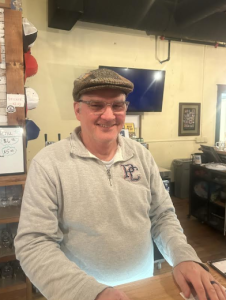The Bluest Hose: Dealing with Anxiety and Depression at PC
February 18, 2015
My freshman year was quite a struggle for me due to dramatic changes I was going through as a new college student. There were random moments where I would just break down in tears. I never wanted to socialize, and I hardly ever left my room aside from going to class (which was a struggle for me also). I felt hopeless – like I would never accomplish anything in life. I felt anxious all of the time and found it hard to breathe quite often. It was very difficult for me to understand why I was feeling the way I was, and I think a lot of students often feel the same way.
I didn’t know how to cope with these feelings on my own, so I went to speak with Susan Gentry-Teasley, Presbyterian College’s Director of Counseling Services. After telling her about the way these symptoms were affecting me, she referred me to a great psychiatrist who diagnosed me with both anxiety and depression. It took me a while to come to terms with these disorders and accept them, but as it turns out, there are many more people struggling with the same symptoms. According to the 2013 National College Health Assessment, roughly one third of college students had struggled with depression in the preceding 12 months, and nearly half had experienced serious anxiety.
Being college students can often cause us to become overwhelmed and anxious. Sometimes it can even lead us to feel hopeless or worthless. Anxiety is a feeling of worry, nervousness or unease, typically about a forthcoming event or uncertain outcome. Chest pain, headaches, neck tension, fear of impending doom, shortness of breath, heart palpitations, feeling like you’re going crazy, inability to rest and sleep problems are all symptoms of anxiety. Depression is severe unhappiness and gloom, typically felt over a period of time and accompanied by feelings of hopelessness and inadequacy. Symptoms include distorted views on life, a negative attitude that leads to difficulty in understanding how to resolve problems or situations, irritability, difficulty concentrating, lack of energy and feelings of hopelessness and/or helplessness.
So what can we do to cope with these feelings? I spoke with Susan about how people with these disorders often feel as if they are the only ones dealing with them.
“Spend time with support—friends and family. And avoid isolation, because is only makes the feelings darker,” said Dr. Gentry-Teasley.
She also said, “People often feel alienated because they think they are the only one dealing with a problem. When they talk to others, they realize that they are not alone, and the problem seems more manageable.”
“Treat yourself like your own best friend. You wouldn’t tell your best friend that he or she is a useless moron, why would you think such critical thoughts about yourself?”
Personally, I owe my recovery process all to Susan. She is very personable, and talking to her was like talking to one of my best friends. It was easy for me to open up to her and explain the feelings I was enduring. I encourage you to make an appointment with her if you need someone to talk to, even if not about anxiety or depression. She is there to lend an ear and offer advice for everyone, and is a valuable mental health resource at PC.
According to Dean F. MacKinnon, MD, an associate professor at the Johns Hopkins Hospital in Baltimore, “When you’re in the grip of depression and anxiety, it can feel like the misery will never end, that you’ll never recover. But people do recover. You just need to find the right treatment.”
I couldn’t have said it better myself. Then again, I’m not a doctor. I wanted to give a firsthand student account of dealing with these disorders so that you might understand this experience and to show you that if you are struggling like I am, you are not alone.





